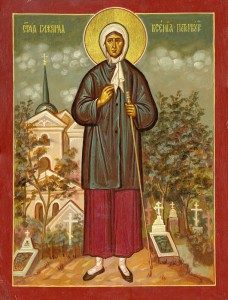 Where the strange homeless woman Mary is concerned, there have been a lot of conflicting impressions. Vanessa has heard from that she was dangerous, that she was developmentally disabled, that she was insane. Personally, she thought the little woman was just odd, but over time, came to feel that something else was going on. When she thought she recognized Mary in the Miracle of the Geese, a light went off. When so, Vanessa was finally in the place on her Saturday out on the Plaza where you stop asking questions, she sees Mary again … and just knows she has to try to learn what Mary can teach her. In church the next day, she has a lot to reflect upon. In the time they spent together on Saturday, Vanessa came to see that Mary was the kind of person that had no guile in her — loving life, because she loves “the dear Lord.”
Where the strange homeless woman Mary is concerned, there have been a lot of conflicting impressions. Vanessa has heard from that she was dangerous, that she was developmentally disabled, that she was insane. Personally, she thought the little woman was just odd, but over time, came to feel that something else was going on. When she thought she recognized Mary in the Miracle of the Geese, a light went off. When so, Vanessa was finally in the place on her Saturday out on the Plaza where you stop asking questions, she sees Mary again … and just knows she has to try to learn what Mary can teach her. In church the next day, she has a lot to reflect upon. In the time they spent together on Saturday, Vanessa came to see that Mary was the kind of person that had no guile in her — loving life, because she loves “the dear Lord.”
So who or what is Mary, exactly?
We finally get the vital clue in chapter 20 from Sister Gabriella, who helps put Maggie’s reservations to rest by vouching for Mary’s character. Prodded by Vanessa for more information, the nun hesitates.
Sister Gabriella frowned in thought. “There are things I can’t quite make out — a depth of sorrow that she keeps to herself. She has just found ways of dealing with it. All I can tell you is that whatever she’s doing isn’t coming from a disordered mind. And I should know. We see many unfortunate people like that here. But she’s not like them. Somehow, she survived, and she has kept a kind of innocence that we rarely see anymore. If anything, I think she has a lot more in common with the kind of saints we call ‘holy fools.’
Simplicity masked as foolishness
That’s a term that Vanessa wasn’t totally familiar with. In the Orthodox Church, we have a tradition of saints who hid their piety from others in order to avoid drawing unwanted attention to themselves. Called “holy fools” or “fools-for-Christ” — more info HERE — some of them dressed in rags or flouted convention in any number of ways. They were often poor, because they would give away all their money and possessions. They must have seemed like very bizarre people, but from the accounts given, they often also had gifts of special insight and foreknowledge. Consider, for example, this anecdote about the 18th-century Russian saint, Xenia of Petersburg:
Among the friends of Blessed Xenia, there was a widow, Mrs. Golubev, and her 17-year-old daughter. Xenia liked the girl very much because of her quiet character and kind heart. Once, Xenia came over for a visit and then suddenly upbraided the girl, saying, “Here you are drinking your coffee and your husband is burying his wife in Okhta. Run there quickly!”
The girl was shocked. “My what?! I don’t have a husband … and, burying his wife??“
But Xenia insisted and wouldn’t take no for an answer. The Golubevs, knowing well that Xenia never said anything without a reason, obeyed her command and left for Okhta. When they arrived, they saw that a funeral procession was headed for the cemetery, and they joined in with the crowd of mourners. A young woman, the wife of a doctor, had died in childbirth and was being buried.
The liturgy was celebrated and then the funeral service, after which the Golubevs followed as the coffin was carried to the grave. The funeral had ended and the people began to leave. However, they chanced upon the sobbing young widower who, at the sight of the grave mound over the remains of his beloved wife, lost consciousness and fell to the ground near them. Both mother and daughter strove to revive and comfort him. They became acquainted and, eventually, the young Miss Golubev became the wife of the doctor.
The fact is, for Vanessa to have any shot at winning her bet with James, she is going to need some special help. I loved the chance to try and write what it might be like to spend time in the company of one of these very unique holy people. But the fact is, it was hard work, as well. So much of it was guesswork. I have met a couple of people in my life that I think had something of this quality of holiness (more about that later), and I observe that there’s nothing to say that being around them is an easy experience, or that they’re good company in the ordinary sense. They can come off as abrupt or odd; people seem to mistake their guilelessness for stupidity. They may even be a little rude.
What I have never encountered is someone who had those gifts that I mentioned. Mary is such a person — she knows Vanessa inside and out, it seems, and is able to give her advice that is more like “a word of truth.”
And as for her being Daughter Lily, we finally have it completely established that she is. But along with that, an insight into the pure soul of the little girl who was able to perform that miracle:
“How did you do that?” Vanessa asked. “How did you get the wild geese to come?”
Mary-Lily had been gazing at her, slack-jawed. But she roused herself after a moment and her eyes opened wide.
“But I wasn’t singing for the geese. I was singing for … ” She looked momentarily flustered, and made a kind of circle in the air with both hands.
“What?” pondered Vanessa, following her hands. “The air? The room? Everything?”
“Yes,” Lily replied in relief. “I was singing for everything. For the whole world. The geese are just the only ones that heard me.”
And now, it’s Vanessa’s turn. As we’ve seen once or twice, instead of the still, small voice that Abigail has, Vanessa has just one word that comes to her sometimes: Listen. That helped her find Matilda the rat, and it helped her find Mary. Now that she has found her, what will she hear?
Stay tuned.
Coming Thursday: About Photini’s problem, and Vanessa’s conversation with James
